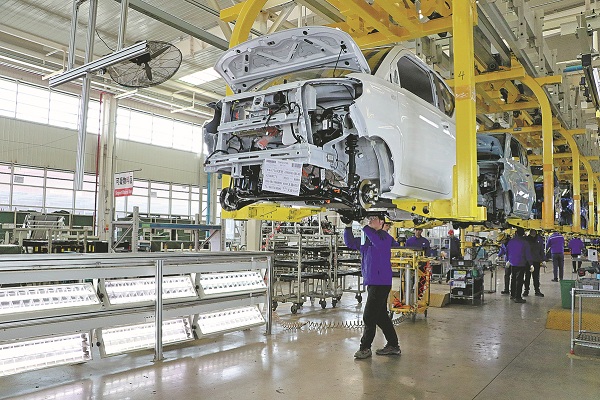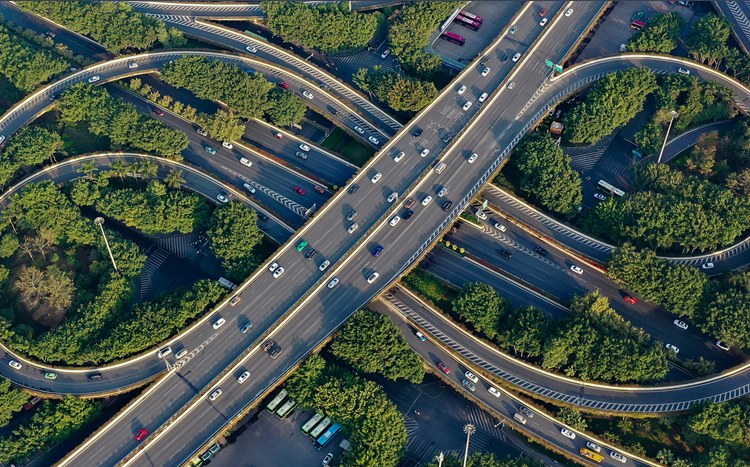City of Liuzhou leads the charge in NEV sector

Workers assemble new energy vehicles at an automobile manufacturing factory in Liuzhou, Guangxi Zhuang autonomous region, in 2021. [Photo provided to China Daily]
Editor's note: This series of stories looks at local enterprises in specialized sectors that have a share in global markets.
When marketing manager Yan Xi shopped for her first car, she was happy to find one that suited her needs.
"I wanted a practical, trendy vehicle for the city, but something that was also personal," said Yan, 25.
Like many young residents of Liuzhou in South China's Guangxi Zhuang autonomous region, Yan now drives a new energy vehicle, or NEV. The compact, two-door electric car can plug in to the city's growing number of charging stations.
"My NEV also takes up half the space of a normal car, so I never have to worry about parking in tight spots," said Yan, who bought the vehicle for less than 50,000 yuan ($6,950), or just a few months' wages.
She added a personal touch by customizing the car with decals of her favorite cartoon cat character.
Major green push
Her NEV is among locally produced cars zipping around Liuzhou as the city gears up to lead the way in the nation's major green push in the auto sector. This is in line with the Made in China 2025 action plan of the State Council, China's Cabinet. The 10-year action plan, introduced in May 2015, aims to upgrade and transform Chinese manufacturing to make strides toward the country's sustainable development goals.
NEV sales nationwide exceeded 6.8 million units last year, with a market share of more than 25 percent, according to industry figures.
Liuzhou is an industrial hub of Guangxi, with the total output value of its major enterprises reaching 420.09 billion yuan last year, or one-fifth that of the entire region.
Regional manufacturing giants in the prefecture-level city cover most major categories, ranging from automobiles, machinery and steel, to chemicals, building materials, food and pharmaceuticals.
Liuzhou's NEV output hit 666,000 units in 2022, a year-on-year increase of 38 percent, and that accounted for about 10 percent of the national figure, according to city authorities. To complement the growth, municipal investments in NEV infrastructure, including designated parking spaces and more than 1,300 public charging areas, also increased.
In 2022, the city's NEV sales accounted for over 53 percent of its total automobile sales, ranking it first among cities nationwide, according to city authorities.
Liuzhou Vice-Mayor Tang Zhenguo said the sector is expected to be dominated by "intelligent and connected pure electric and hybrid vehicles" in the next three to 10 years.
Liuzhou, with its status as a regional hub, will comprehensively strengthen innovation and industrial links to promote the transformation and development of industries to become high-end, intelligent and green, Tang said.
Priorities include the full electrification of vehicles in the public sector and establishing and improving NEV power-battery recycling and a solid waste treatment system to boost the life cycle of products, he said.
"Promoting the intelligent transformation of parts manufacturing enterprises, building intelligent factories, improving supplier management capabilities, and reducing operating costs and energy consumption levels" will also be emphasized, he added.
The Wuling Hongguang Mini EV model, driven by residents like Yan Xi and manufactured by Liuzhou's leading NEV automaker, SAIC-GM-Wuling Automobile, is making significant inroads in the sector. Its sales volume has hit more than 1.37 million units since its rollout seven years ago, according to the company.
Zhang Yiqin, the company's brand and public relations director in Liuzhou, said the transformation of the sector is in tandem with the evolving needs of consumers.
"After years of rapid development, the new energy vehicle industry has developed significantly. Consumers' attention to and acceptance of new energy vehicles are increasing, they understand and pay more attention to NEV quality and configuration, and improving the quality of science and technology and products has become the general trend," Zhang said.
"With the change in user demands, the logic of new energy vehicle manufacturing, the entire production process, including R&D, manufacturing and services, will be transformed. New energy standards will also be reshaped, and the first to establish standards for the industry can become a new energy leader, leading the NEV industry to provide users with a better travel experience," he said.
The industry leader is now introducing measures to keep pace with development trends.
"In February 2023, a major framework agreement was rolled out to include the development of a new energy laboratory in line with national laboratory standards to provide technical support, integrating the best resources of the whole industrial R&D chain, intelligent manufacturing and services ecology… toward the further promotion of the autonomy of the country's whole NEV industry chain," Zhang said.
Efforts are also being made to leverage Wuling's NEV head start to expand overseas amid the global green drive.
"In recent years, the economic development of Southeast Asia and India has been rapid, and the level of people's incomes has greatly improved. … The population and market potential are large, with the space for growth broad and promising," Zhang said.
The automaker exported nearly 193,600 vehicles in 2022, a year-on-year increase of 33 percent, while its scooters are "also very popular overseas, opening a new chapter in the globalization of the company", Zhang added.
Three-step strategy
"We will grow our globalization strategy with a three-step strategy," Zhang said.
"The first stage will be centered on Indonesia, then opening up the Southeast Asian and Middle East markets, and promoting the establishment of local electric vehicle standards," he said.
"In the second stage, we will explore markets such as India and Egypt, with overseas factories for supply and an increase in localization efforts.
"The third stage will be to enter Europe, Japan, South Korea and other markets, and fully establish our global competitiveness in new energy products."
In mid-May, an NEV vehicle testing and certification industry alliance covering the Chinese and Southeast Asian markets was rolled out in Nanning, the capital of Guangxi. The move is expected to "give full play to the attributes of quality certification and promote the 'Chinese approach' in NEV quality to go global", according to the local government.
Li Ze, director of Guangxi's market supervision administration, said the region sees the move as an opportunity to provide services such as standards development, testing and evaluation, defect diagnosis and improvements in the sector, to provide "Guangxi intelligent manufacturing" NEV products that better meet the needs of the Association of Southeast Asian Nations market.
In Liuzhou, Yan Xi and other young city residents who are driving NEVs have a front-seat view of their generation's development path toward a green future.
"There's even an NEV motoring club for us like-minded drivers," she said.
"It's not just about transportation for us. We share our experience and aspirations of being part of a sustainable lifestyle."














